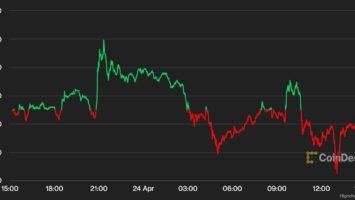Top Shelf
The world is growing more comfortable with the idea of digital assets, with several nations stepping forward today to discuss the designs of central bank digital currency (CBDC) programs.
Speaking at Consensus: Distributed’s Future of Fiat Workshop, central bank executives sent smoke signals regarding CBDC pilot programs. Harvesh Seegolam, of the Bank of Mauritius, the world’s youngest central bank governor, said the island nation is looking to issue a retail digital asset distributed through the established banking system.
You’re reading Blockchain Bites: Consensus Edition a twice daily roundup of all the notable news out of Consensus: Distributed. You can sign up for this, and all of CoinDesk’s newsletters here.
This could be a lobbying moment for tech firms and the crypto industry to get in on the action. But Simon Scorer, Bank of England’s Senior Fintech Specialist, said the bank will not be limited by the current crop of technological options. “We’re clear that any choice of technology around a CBDC should be led by a set of requirements and not the other way around,” he said. That is, if they move forward on a digital pound.
Privacy advocates raised the alarm over the growing sentiment in favor of CBDCs. According to a recent poll from the Bank for International Settlements, a club for central banks, 80% of surveyed countries are in some stage of CBDC research or development. Whatever form these pilots take will walk the balance between privacy and greater visibility into the financial system.
Sheila Warren, head of blockchain at the World Economic Forum, said CBDCs will deliver on promises of more granular financial tracking mechanisms that authorities have made no secret about wanting. But this also opens the door for privacy coins to come into fruition.
As Elena Sofia Giralt said in None of Your Business: Why Our New Virtual Lives Need Crypto Privacy, privacy is not just a blanket release but something you should have a choice over.
The CoinDesk 50
Besu, the Marriage of Ethereum and Hyperledger
There have been dalliances between Hyperledger and Ethereum over the years. The latest lovechild, Besu, was designed from the ground up to let large enterprises connect to the public Ethereum blockchain. There are benefits on both sides. On the public, or permissionless, side of things, Ethereum has the largest developer community in crypto, building tools corporations may not even know they need yet. On the other, Hyperledger’s permissioned blockchain is where many of the corporations looking at this tech feel most comfortable. Ethereum’s true believers have always viewed big business using the public mainnet as a signifier for their “world computer” status. With Besu, that claim may become a reality. Read the full story here.
We’ll announce another five organizations tomorrow. You can see the full list here.
CoinDesk COVID Response
#NYBWGives
CoinDesk has joined Gitcoin, The Giving Block and Ethereal Summit to support charities helping communities in difficult times. We’re raising $100,000 and giving you a voice through the quadratic funding model. Learn how it works and how to donate.
In addition, New York-based abstract artist Mr. Star City created an original piece of artwork, shown above, as a part of Consensus: Distributed. The art, inspired by love, unity and technology, will be up for auction this week. Follow @coindesk on Twitter to find out how to bid — the proceeds will go to the same cause.
Media Diet
JPMorgan Bank Takes on Coinbase, Gemini as Its First Crypto Exchange Customers
The move by JPMorgan is notable in a nation where banking services are hard to come by for any firms dealing with cryptocurrencies, which are viewed as a high risk by the banking industry. Accounts for the two crypto firms were approved last month, the sources said, and are now in use.
US Banking Regulator Suggests Federal Licensing Framework for Crypto Firms
Brian Brooks, chief operating officer of the U.S. Office of the Comptroller of the Currency, the nation’s national bank overseer, said he believes crypto companies could fall under a federal licensing regime – if they provide what can be described as payment services. If this is true, it could help ease the hodgepodge of state laws that prohibit some companies from operating in certain jurisdictions.
IBM Blockchain to Offer Decentralized Smart Contract Option
The blue-chip IT firm said the IBM Blockchain Platform would upgrade its system to provide a new decentralized governance option and smart contract functionality, by porting over changes made in its base layer Hyperledger Fabric 2.0.
UAE Bank Opens Bangladesh Remittance Corridor Using Ripple’s Blockchain Tech
United Arab Emirates-based retail and business bank, RAKBank, is expanding its remittance routes to Bangladesh using Ripple’s blockchain technology.
Binance Invests in Regulated Indonesian Crypto Exchange
Binance is making a bet on the potential of the Indonesian crypto market, making an undisclosed investment into the Jakarta-based and regulated exchange, Tokocrypto. There is no independent data showing just how big the local crypto market is, but sources speaking to Reuters in February put it at possibly the same size as the country’s stock market, despite rigid regulations.
The Best Backgrounds at Consensus: Distributed
Harry “Hasta Siempre” Halpin

How To Use Brella
To access all of the deeper cuts available through Consensus: Distributed, you’ll need to login through Brella, our virtual conferencing platform. You can create an account through Gmail, LinkedIn, Facebook or set one up manually on Brella. Your profile will be the way you match and network with others. As soon as you’re set up, you’ll be directed to a dashboard showing other registrants.
Brella is easy to use and has a number of features to help you through this virtual experience. There are multiple tracks of simultaneous programming happening inside Brella. You’ll also be able to browse the entire agenda, bookmark sessions and build your own schedule.
Brella is a great networking tool as well, be sure to check out some of the social features available in-page, and reach out to the people and organizations that pique your interest.
Audio Lounge
Tradable Metrics
Chainalysis Chief Economist Philip Gradwell and PwC’s Henri Arslanian sit down to discuss the tradable metrics made public on blockchains. Tune in here.
Consensus Magazine
Today: Crypto Under Corona: From Switzerland to Liberland
How are the united nations of crypto holding up during COVID-19? Jeff Wilser checks in with seven subcultures and finds good prepping standards.
Tomorrow: Generation Crypto.
Freelance journalist Jess Klein writes about an emerging psychographic of people who see the world through the lens of decentralization. Unset by the traditional bounds of age, country or class, Generation C is bound together by a willingness to question mainstream narratives and an unceasing desire to topple authorities. Check it out tomorrow.
CoinDesk Confessionals
This quixotic questionnaire is designed to reveal the respondents cryptic crypto thoughts, feelings, and insights about our industry to better understand what makes our internal hashrates spin. Loosely based on the “Proust Questionnaire” popular during the fin de siecle, we’re hoping their honest answers will reveal insights about our own age of transition.
In our first round of CoinDesk Confessionals, Kathleen Breitman, Tezos’ co-founder, responded to our prompts with the first thought that came to mind, over email.
Crypto Questions
Your favorite blockchain protocol?
Tezos, of course!
Your #1 favorite crypto hero?
My co-founder, Arthur.
Your favorite quality in an entrepreneur?
Curiosity.
Your biggest fear?
Being unlucky, timing.
What would you value bitcoin at today?
Markets are efficient
One word on how you got into crypto?
Camaraderie
Who is your crypto hero?
Arthur Breitman
What should crypto disrupt next?
Gaming, of course!
Public or private?
Is private still a thing?
Permissioned or permissionless?
As an anarchist, I can only check permissionless.
Your best example of sovereignty?
Queen Rania of Jordan seems delightful.
Your net worth?
A lot less than the Internet would have you believe.
What defines Satoshi?
The intelligence to remain anonymous.
Your favorite economist?
Ronald Coase!
Which living person do you most despise?
Kim Jung-un
When and where were you when you first heard about BTC?
I don’t remember but it was probably in 2011.
Do you mine? Would you mine mine?
No.
Your favorite non-crypto book?
Right now? Harmonium, Wallace Stevens.
Your most visited webpage?
Twitch.tv
Cryptic Lifestyle
What inspires you?
Love.
What is your main fault?
That’s a competitive category, but let’s go with pride.
Your main hero characteristic?
Bravery.
What is your current state of mind?
Weltschmerz
What or who do love the most?
My family.
When and where were you happiest?
Falling in love with my husband.
What gets you out of bed?
Ideally? The smell of coffee.
What is your motto?
It’s not a motto in the strict sense, but I often think that “the mind is its own place and in itself, can make a Heaven of Hell, a Hell of Heaven.”
What would you like to be?
Luckier.
Where would you like to live?
Anywhere with Arthur suits me fine.
Your favorite television show or movie?
Arrested Development seasons 1-3 shaped my sense of humor during my formative years.
Your most vivid memory?
Big hugs.
Your greatest achievement?
Being a good partner.
What do you rely on?
My network, my judgement of people.
What would you change about yourself?
Sleep schedule.
Where will you be in 10 years?
That’s 70 years in crypto, no? Hard to say.
Your favorite fiction character?
Sherlock Holmes.
How do you spend your free time?
Reading, bad TV.
What do you want your legacy to be?
Bringing other people up with me.
How would you like to die?
In a blaze of glory.
Who Won #CryptoTwitter?
Disclosure Read More
The leader in blockchain news, CoinDesk is a media outlet that strives for the highest journalistic standards and abides by a strict set of editorial policies. CoinDesk is an independent operating subsidiary of Digital Currency Group, which invests in cryptocurrencies and blockchain startups.








Comments (No)